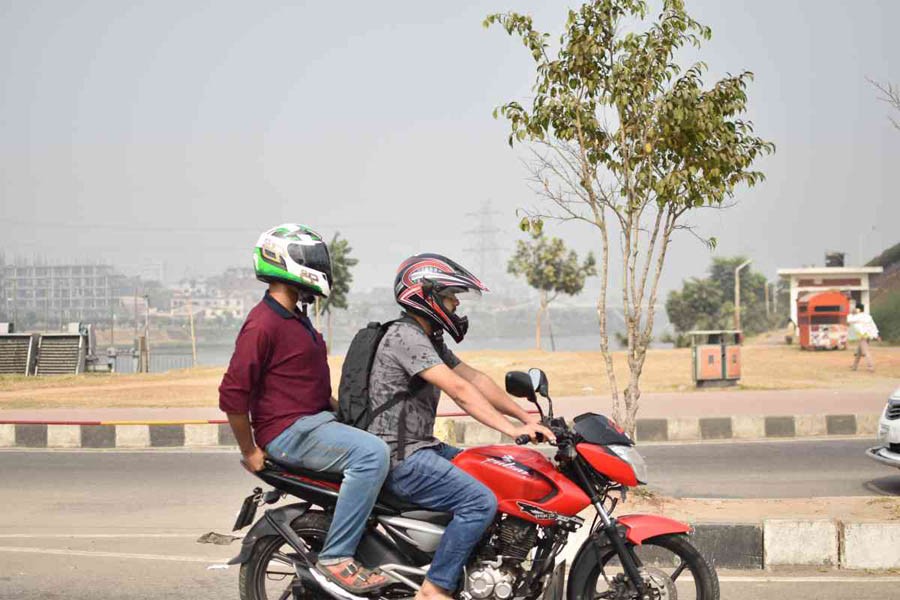
Published :
Updated :

Commuters in Dhaka city must have noticed the change in mood and approach of the auto-rickshaw drivers in recent days. They are now not as arrogant as they used to be before.
These days, they usually offer two options before their prospective passengers; metered fares plus Tk 20-30 extra payment or negotiated fares. However, the drivers of these CNG-driven small motor vehicles are found to be more attentive to passengers' call.
Even a year back, newspapers did very often carry stories on the plight of passengers wanting to avail the services of auto-rickshaws. On occasions, angry passengers were found engaged in brawls, even scuffles, with arrogant auto-rickshaw drivers. Now such scenes are rare in Dhaka streets as passengers find the auto-stands crowded with a sufficient number of three-wheelers even during peak hours.
Why are all these changes? The fast spread of ride-sharing services has made it possible. Uber car services did the first damage albeit on limited scale. But the city's auto-rickshaw service is receiving the most severe blow from the ride-sharing bike service, which is fast, cheap and widely available. Yet another advantage the city dwellers like most is that the vehicles under the ride sharing services would pick passengers from their doorsteps.
Ride sharing services, no doubt, are offering easy and affordable alternatives to commuters who until recently were victims of whims of auto-rickshaw and taxi drivers.
But there is the other side of the story which is not at all palatable, if seen in the context of the city's worsening traffic situation.
One can hardly miss these days the presence of swarms of motorbikes in most city streets. Other road users and traffic management people have started looking at the bikes with contempt since the latter gives a damn to traffic rules and their own as well as others' safety. When other vehicles remain stuck in traffic gridlocks, the bikers move on to roadside pavements arousing great annoyance among pedestrians.
With their numbers rising manifold over the last couple years, the motorbikes have emerged as moving irritants on city streets. Even the traffic police are found to be clueless in managing the motorbikes. They are not aware of the actual number of bikes now plying the city streets.
The number of bikes registered with the Dhaka offices of the Bangladesh Road Transport Authority (BRTA) is over half a million. But the actual number is far more since a significant number of bikes enter the city every day from districts, mainly those adjacent to Dhaka, to provide ride-sharing service. Unofficial estimates put the number of bikes engaged in ride-sharing under six registered app-based transport companies at more than 400,000. Hundreds more are operating ride-sharing service independently.
Motorbikes, prior to the introduction of ride-sharing service, in most cases, did comply with traffic rules. But these days, those bikes too are found to be as unruly as the ride-sharing ones.
What is more worrying from the point of traffic management view is that the ride-hiring motorbikes have created their own temporary stands at important road crossings of the city.
The swarms of motorbikes almost in every city road are causing serious inconveniences to other vehicles. Buses and private cars with a view to avoiding fatal accidents are exercising utmost caution. This is affecting their normal mobility and manoeuvrability.
Yet there has been rise in the number of road accidents in Dhaka city in the recent times. The rise is mainly attributed to rash movement of motorbikes. In 2017, incidents of motorbike crash claimed lives of 53 people and left 19 more injured in Dhaka. During the first eight months of last year, 47 people died in recorded road accidents involving motorbikes.
The bike-based ride-sharing became popular almost instantly because of the absence of fast transportation facilities. Now some projects are in different stages of implementation to make available fast transportation service to the people.
The gap should have been filled up by fast-moving bus services. Unfortunately that has not happened and the reasons are known to all. The emergence of any efficient bus service is not possible in a transport sector where anarchy reigns supreme.
Thousands of unemployed youths are now engaged in ride-sharing bike service. Even some people have taken it up as the second source of earning.
But the fact remains that an unregulated entry and plying of a huge number of small vehicles such as motorbikes have further worsened the city's traffic situation. It is high time that the BRTA and the Dhaka Metropolitan Police (DMP) initiated tough measures to control this menace.
The government is now encouraging production or assembling of motorbikes in the country. The growth of the bike industry poses no problem. But unbridled increase in ride-sharing bikes turns out to be a serious problem. The government cannot be just an onlooker in this case.


 For all latest news, follow The Financial Express Google News channel.
For all latest news, follow The Financial Express Google News channel.